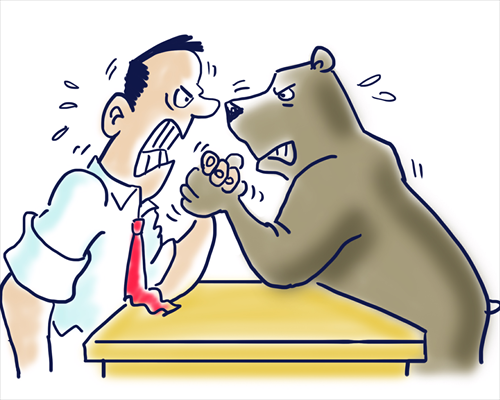Russia and the West: no easy way forward in new year

Illustration: Liu Rui/GT
This year has seen a "new normal" in relations between Russia and the West: systemic conflict with small and occasional examples of cooperation. Compared to 2014, the year of the Crimean crisis, war in eastern Ukraine, the tragic downing of MH-17, Western sanctions against Russia and acute disputes over Syria, 2015 was at least a somewhat positive year. It started with Minsk-II talks, which allowed to reduce violence in Donbas, ended with Russia, the US and some key European powers trying to find modus vivendi in Syria, and delivered a deal over Iranian nuclear program. Is it then justified to expect that we may see gradual improvement of Russian-Western relations? Hardly so. A sober view on the underlying issues and on the political calendar requires us to expect a new low.
First of all, the roots of confrontation between Russia and the West have not been addressed. The gap of mutual perceptions is widening. Russia is seen by most policymakers in the US and EU as a revisionist power, which seeks to challenge the existing international norms and undermine the Western principles. The country's leader, President Vladimir Putin, is portrayed as a cowardly dictator, suppressing civil rights at home and destabilizing Russia's neighbors through hybrid warfare. In the international domain the Kremlin is supporting the regime of Bashar al-Assad, which is seen by the West as the cause of prolonged conflict in Syria.
In Russia, the US is seen as a player trying all means to maintain its fading global dominance and creating problems for rising powers like Russia or China through "color revolutions" and creating chaos in the Middle East. Moscow sees Western sanctions against Russia or the creation of new trade blocks like the Trans-Pacific Partnership as use of economic weapons. The systemic lack of trust between the leaders and societies precludes meaningful dialogue on these issues any time soon.
A key marker for the improved relations would be the roll-back of Western sanctions against Russia. But the most crucial parts of the sanctions regime are likely to stay in place in 2016. The criteria for removal of sanctions remain formal and are tied to Minsk II. Moscow is highly unwilling to implement several parts of the Minsk deal, including full withdrawal of its troops from eastern Ukraine and return of control over the border to the Kiev government. Even if some of the EU measures are abolished, US sanctions will stay in place.
The prospects for resolution of Syrian conflict remain dubious. The US and Russia are highly unlikely to form a real military partnership to eradicate the self-proclaimed Islamic State. Moscow's key goal remains supporting the current regime in Damask, so it can continue its air raids against military groups which are defined as "moderate" by the West.
Even if the major powers achieve some form of consensus, regional powers with competing interests like Turkey, Saudi Arabia and Iran have powerful tools to undermine these efforts. Widening conflict between Moscow and Ankara is yet another factor blocking normalization of the relationship.
Last but not least, the political calendar in the US and Russia suggests a high probability of conflict. All the major candidates for the US presidential elections are very hawkish on Russia, save for Donald Trump, so debates in public space will be full of tough language and personal attacks on Putin. In this environment the outgoing administration is highly unlikely to do anything meaningful to improve the relationship even if it chose to do so.
In Russia, 2016 is the year of the State Duma elections. If history is any guide, anti-Western rhetoric will be everywhere. With low commodity prices and prolonged mismanagement of the economy the Kremlin has no better choice as to blame economic troubles on the hostile West.
Recent examples of official reaction to opposition activists' investigations into high-profile corruption cases show that the authorities always blame these investigations as CIA-orchestrated campaigns against "innocent officials." Many also expect further suppression of NGOs, human rights activists and election monitoring organizations as the votes approach.
It's very hard to imagine how Russia and the West can talk constructively under these circumstances.
The author is senior associate and chair of the "Russia in Asia-Pacific" Program at Carnegie Moscow Center. opinion@globaltimes.com.cn